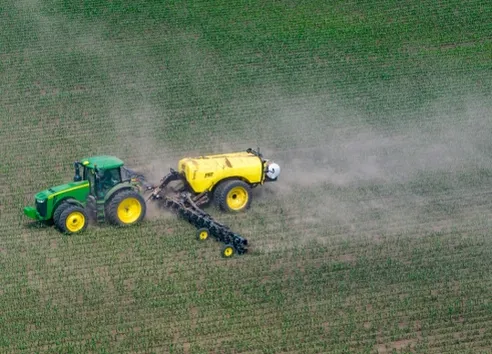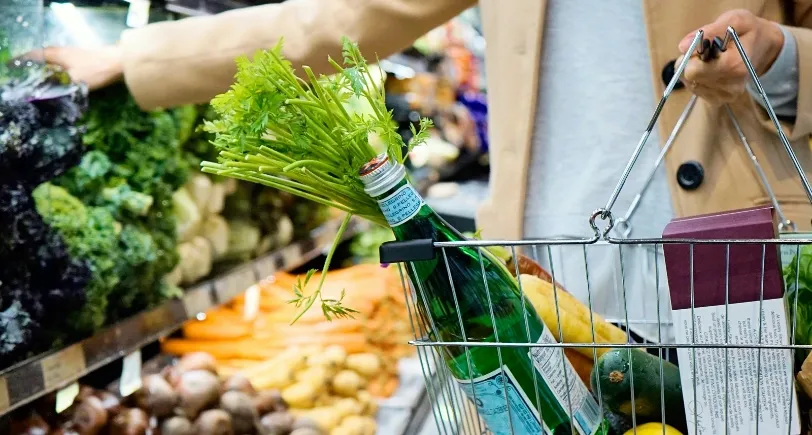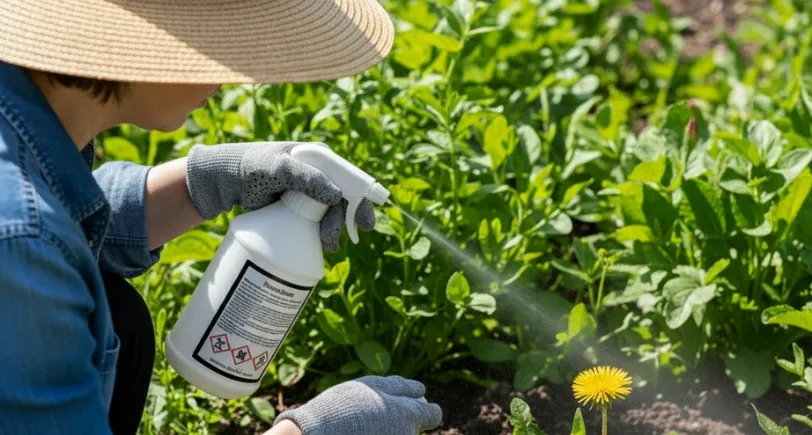Pesticides and breast cancer.
What is the link?

Are pesticides linked to breast cancer?
Most research suggests that working with or having high levels of pesticides (especially those now banned) in the body may increase breast cancer risk. It's important to note that not all studies agree on this link, and there's very limited research on risk from pesticides in our food (dietary exposure).
Pesticides may cause cancer to develop by damaging the DNA or acting as Endocrine Disrupting Chemicals (EDCs). Some pesticides have been internationally classified as “probably carcinogenic” to humans, which means that there is some strong evidence that they can cause cancer.
Others are classified as “possible carcinogens”, as the available evidence is not as strong but still suggests a link to cancer. However, this classification has so far only looked at a fraction of all the pesticides authorised in the UK.
Tips to reduce your exposure to pesticides.
Pesticide-free gardening.
Build healthy soil, encourage beneficial insects, and use physical barriers like netting to control pests, making your garden productive without using pesticides.
Wash produce well.
Wash all produce thoroughly under running water to remove pesticides and contaminants. Where possible, choose organic food, especially for items with peels (like citrus), to reduce pesticide exposure.
Grow your own.
Grow your own fruit and vegetables at home to control what they are exposed to, ensuring they are fresh and pesticide-free.
Key facts about pesticides.
- Pesticides are chemicals used to control weeds, insects, fungi and other pests.
- You may be exposed to low levels of pesticides through your diet, or to high levels if you work with these chemicals.
- In 2023, 48% of the food analysed in the UK contained at least one pesticide and 33% had multiple pesticide residues.
- Some studies have shown that exposure to pesticides may increase breast cancer risk.
- Eating organic food can reduce your exposure to pesticides by 90% and limited evidence suggests that it may also reduce your breast cancer risk.
How are you exposed to pesticides?
Pesticides are chemicals (like herbicides, insecticides, and fungicides) used to control pests. About 420 types are currently authorised in the UK for use in farming, public and residential areas, and gardens.
Exposure happens in three main ways:
- High-level exposure (occupational): occurs when people work directly with pesticides, such as manufacturing them or spraying them on farms.
- Low-level exposure (environmental/dietary): occurs over long periods through the food you eat or when local authorities spray pesticides near your home.
- Banned pesticides (persistent): you can still be exposed to chemicals that were banned long ago (like DDT) because they stay in the environment and accumulate in the body.
Are pesticides present in my food?
In 2023, about 48% of the food analysed in the UK contained at least one pesticide residue. Whilst only 1% of the samples had levels above the Maximum Residue Level (MRL), 33% of the food contained more than one pesticide.
The MRL is the highest level of a certain pesticide allowed in food that doesn’t cause a harmful effect. However, the MRL doesn’t consider the cocktail effect. When multiple pesticides are present, their effects may be added together and this cocktail may be harmful even if each pesticide is below the MRL.
According to PAN UK’s “Dirty Dozen list,” citrus fruits, strawberries, and grapes are the most likely to contain more than one pesticide.
Are pesticides more harmful during certain life stages?
Studies on DDT, which is banned but still present in the environment, are largely inconclusive when considering exposure in adults. However, exposure during pregnancy can affect the unborn child's development and increase the daughter’s breast cancer risk later in life.
An increased risk was also observed for women who were exposed to DDT during childhood. Therefore, exposure to pesticides during certain life stages may have different effects on breast cancer risk.
Does eating organic food reduce my risk of breast cancer?
Some studies showed that a diet rich in organic food may reduce breast cancer risk, especially post-menopause. However, a large UK study found no link between organic food and reduced risk.
Overall, there is some evidence that organic food may have health benefits. However, this could also be because people with an organic diet also tend to be more physically active and have different eating habits.
Swapping conventionally grown food with organic products can reduce pesticide exposure by about 90%. This is because organic food is much less likely to contain pesticides and, when they are found, they are generally below their MRLs and rarely include multiple residues.
What is glyphosate?
Glyphosate (the world's most used weed killer, found in products like Roundup) is classified as a probable human carcinogen and has been shown in animal studies to damage DNA, disrupt hormones, and interfere with mammary gland development. These harmful effects suggest a potential link to breast cancer, though definitive evidence from human studies remains limited.
Start your prevention journey today.
Here are 3 easy changes to reduce your exposure to pesticides:
- Wash and scrub fresh produce: thoroughly wash all fresh fruits and vegetables under running water. You can also peel the skin where possible.
- Choose organic for select foods: prioritise buying organic for foods that are eaten whole (like berries, leafy greens, and citrus) to lower residue ingestion.
- Avoid using them at home: use non-chemical pest control methods (like cleaning, sealing cracks, or weeding by hand) to avoid spraying herbicides (like glyphosate) and insecticides in your garden or home.
Remember, small changes add up over time and can help reduce your risk of breast cancer.
Further reading
For more information, please read our Pesticide, Organic Food and Breast Cancer science review.
Last review: Mar-25 | Next review: Mar-28.
-
- Health and Safety Executive. Pesticides https://www.hse.gov.uk/pesticides/ (accessed August 9, 2024).
- Dahiri B, Martín-Reina J, Carbonero-Aguilar P, Aguilera-Velázquez JR, Bautista J, Moreno I. Impact of Pesticide Exposure among Rural and Urban Female Population. An Overview. Int J Environ Res Public Health 2021;18:9907. https://doi.org/10.3390/ijerph18189907.
- Department for Environment Food and Rural Affairs. The Expert Committee on Pesticide Residues in Food (PRiF). Report on the pesticide residues monitoring programme: Results of Quarter 2 2023 2023. https://assets.publishing.service.gov.uk/media/65f4408a10cd8e001136c682/Q2_2023_PRiF_results_report.pdf (accessed August 9, 2024).
- Panis C, Lemos B. Pesticide exposure and increased breast cancer risk in women population studies. Science of The Total Environment 2024;933:172988. https://doi.org/10.1016/j.scitotenv.2024.172988.
- Cavalier H, Trasande L, Porta M. Exposures to pesticides and risk of cancer: Evaluation of recent epidemiological evidence in humans and paths forward. Int J Cancer 2023;152:879–912. https://doi.org/10.1002/ijc.34300.
- Rebouillat P, Vidal R, Cravedi J-P, Taupier-Letage B, Debrauwer L, Gamet-Payrastre L, et al. Prospective association between dietary pesticide exposure profiles and postmenopausal breast cancer risk in the NutriNet-Santé cohort. Int J Epidemiol 2021;50:1184–98. https://doi.org/10.1093/ije/dyab015.
- Franke AA, Li X, Shvetsov YB, Lai JF. Pilot study on the urinary excretion of the glyphosate metabolite aminomethylphosphonic acid and breast cancer risk: The Multiethnic Cohort study. Environmental Pollution 2021;277:116848. https://doi.org/10.1016/j.envpol.2021.116848.
- International Agency for Research on Cancer. IARC Monographs on the Identification of Carcinogenic Hazards to Humans https://monographs.iarc.who.int/list-of-classifications/ (accessed August 9, 2024).
- Rempelos L, Wang J, Barański M, Watson A, Volakakis N, Hoppe H-W, et al. Diet and food type affect urinary pesticide residue excretion profiles in healthy individuals: results of a randomized controlled dietary intervention trial. Am J Clin Nutr 2022;115:364–77. https://doi.org/10.1093/ajcn/nqab308.
- Mesnage R, Tsakiris IN, Antoniou MN, Tsatsakis A. Limitations in the evidential basis supporting health benefits from a decreased exposure to pesticides through organic food consumption. Curr Opin Toxicol 2020;19:50–5. https://doi.org/10.1016/j.cotox.2019.11.003.


